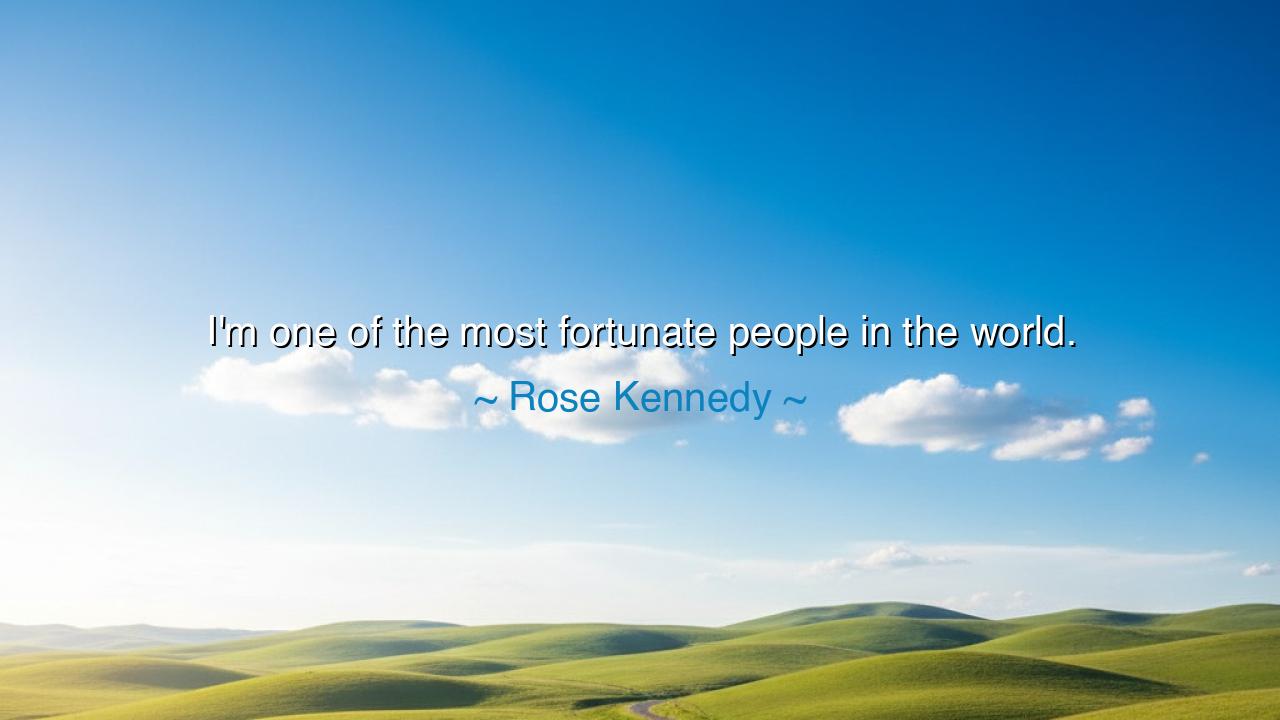
I'm one of the most fortunate people in the world.






The words of Rose Kennedy, “I’m one of the most fortunate people in the world,” are not the boast of pride, but the confession of a heart seasoned by both triumph and tragedy. As the matriarch of one of America’s most storied families, she bore witness to great wealth, influence, and privilege, but also to unspeakable sorrow: the loss of children, the burden of public scrutiny, and the weight of grief repeated across generations. To call herself fortunate amidst such a life is to reveal a wisdom deeper than circumstance, a soul that chose gratitude over despair, perspective over bitterness.
To be fortunate in the truest sense is not merely to possess riches or power, but to recognize blessing even amid suffering. The ancients often spoke of Fortune as a goddess, spinning her wheel, lifting some high and casting others low. Many cursed her for her cruelty, but the wise gave thanks for her gifts, however fleeting. Rose Kennedy’s words embody this ancient understanding: her fortune was not in immunity from pain, but in the love, faith, and resilience that carried her through it. She recognized that her life, even with its losses, overflowed with grace compared to many.
The heart of her words reveals the secret of gratitude. For gratitude is not born of perfection but of perspective. Two souls may endure the same trials; one curses fate, the other gives thanks for what remains. Kennedy, who lost sons to violence and daughters to illness, yet lived with dignity and faith, teaches us that fortune is not measured by what is taken, but by what is given. Her gratitude, rooted in faith, allowed her to call herself blessed even when others would have called her cursed.
History offers parallels to this kind of strength. Consider Job of the Scriptures, who, after losing his children, his wealth, and his health, still declared, “The Lord gave, and the Lord has taken away; blessed be the name of the Lord.” His fortune was not in his possessions, but in the endurance of his faith. Rose Kennedy’s simple statement carries the same spirit: that fortune lies in the ability to give thanks in all things, to see life itself as a gift, even when it wounds.
There is also a lesson in humility. By saying she is “one of the most fortunate,” Kennedy does not claim singular greatness, but places herself among others who are blessed. Her words echo the humility of those who recognize that their good is not self-made but received. In this way, she reminds us that to be fortunate is not to be superior, but to be aware of one’s gifts and to honor them with gratitude.
The lesson for us is profound: fortune is not the absence of suffering, but the presence of gratitude. If a woman who endured such loss could still call herself fortunate, then we too can learn to see our blessings even amidst difficulty. Life will always bring trials, but we may choose whether to focus on the shadows or on the light that yet remains. Gratitude transforms survival into strength, and endurance into legacy.
As practical action, begin to cultivate the habit of declaring your own fortune. Each day, speak aloud one reason why you are among the fortunate: a family member who loves you, a friend who supports you, the simple gifts of breath, food, or shelter. Do not wait for life to be perfect; give thanks in its imperfection. In doing so, you will find that you, too, are among the fortunate, not because life spared you sorrow, but because it gave you strength to endure and gifts to treasure.
Thus, the words of Rose Kennedy stand as a torch for future generations: to be fortunate is not to live without loss, but to live with gratitude despite it. She teaches us that even in grief, one can give thanks, and that gratitude is the truest form of wealth. Her legacy is not only her family’s name, but the wisdom of her spirit: to live as one of the most fortunate people in the world, because one chooses to see life as a gift.






AAdministratorAdministrator
Welcome, honored guests. Please leave a comment, we will respond soon